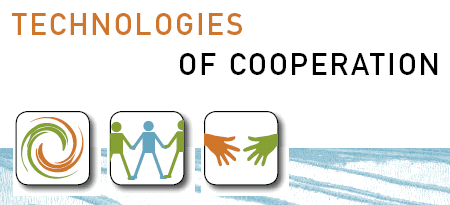Rheingold’s Technologies of Cooperation


Op Marketingfacts.tv verwees ik al eerder naar Literacy of Cooperation, een serie colleges op Stanford (Winter 2005) over nieuwe vormen van samenwerkingen. Deze week verwijst Howard Rheingold op zijn weblog Smart Mobs naar de presentatie die hij recentelijk gaf aan het Annenberg Center over Technologies of Cooperation (pdf).
In deze presentatie gaat Rheingold in op de effecten die digitale technologieen hebben op de manier waarin mensen met elkaar samenwerken. Hij maakt daarbij onderscheid in 8 technologieclusters en 7 strategierichtlijnen die gezamenlijk de Technologies of Cooperation-matrix (jpg) vormen.
De 8 clusters die Rheingold onderscheid:
- Self-organizing mesh networks
- Community computing grids
- Peer production networks
- Social mobile computing
- Group-forming networks
- Social software
- Social accounting tools
- Knowledge collectives
en de 7 strategische richtlijnen die hij daarop loslaat:
- Shift focus from designing systems to providing platforms
- Engage the community in designing rules to match their culture, objectives, and tools; encourage peer contracts in place of coercive sanctions by distant authority when possible
- Learn how to recognize untapped or invisible resources
- Identify key thresholds for achieving “phase shifts” in behavior or performance
- Track and foster diverse and emergent feedback loops
- Look for ways to convert present knowledge into deep memory
- Support participatory identity